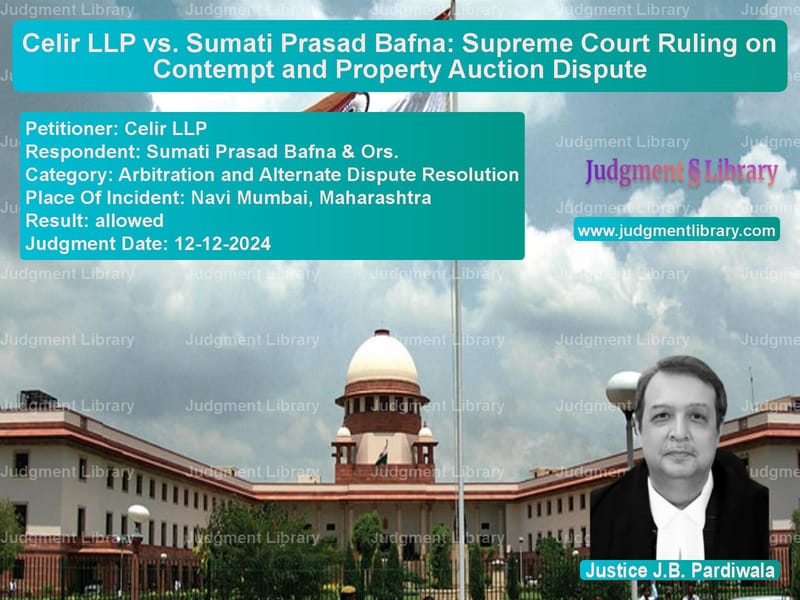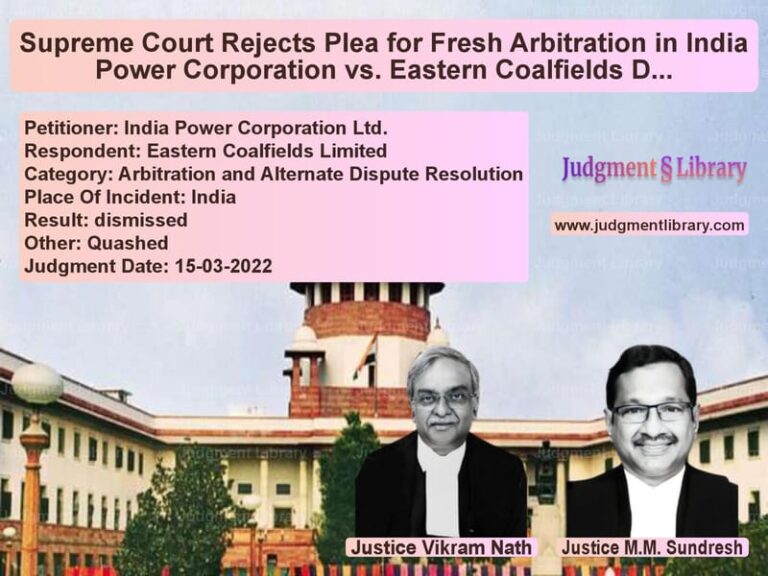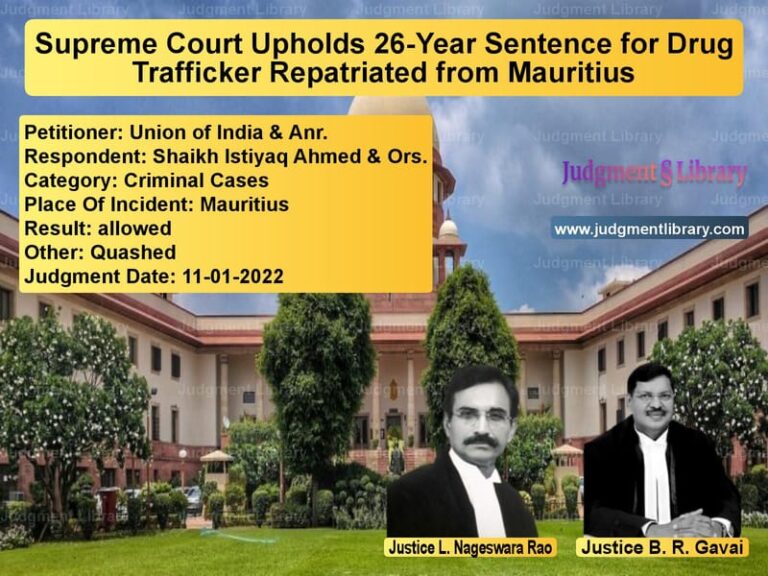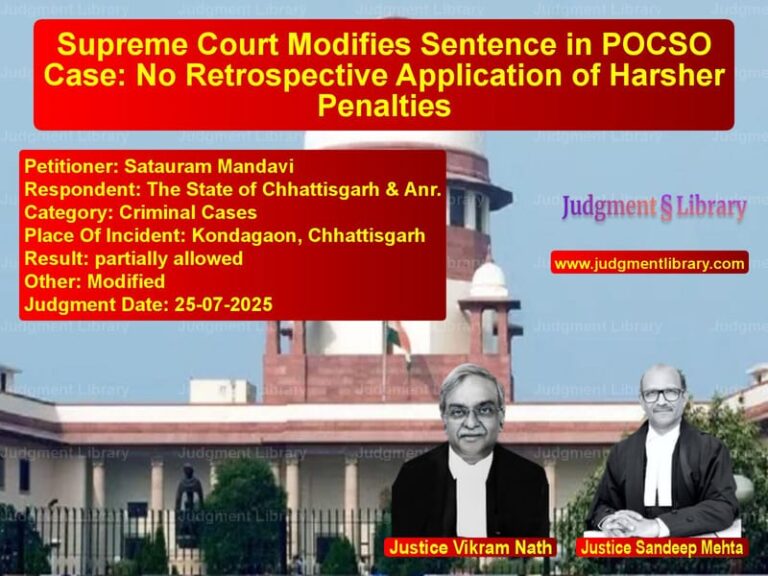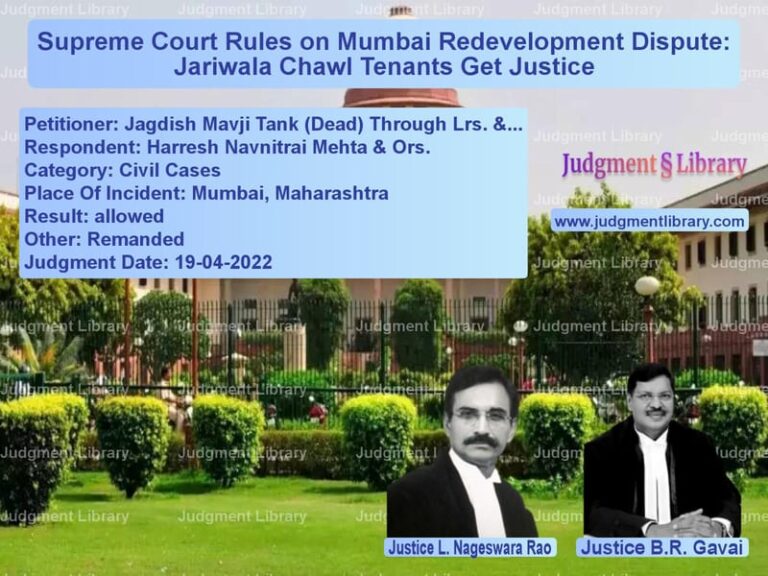Celir LLP vs. Sumati Prasad Bafna: Supreme Court Ruling on Contempt and Property Auction Dispute
The case of Celir LLP vs. Sumati Prasad Bafna & Ors. is a significant Supreme Court judgment that deals with the enforcement of auction proceedings under the Securitisation and Reconstruction of Financial Assets and Enforcement of Security Interest (SARFAESI) Act, 2002. This case highlights critical aspects of property rights, contempt of court, and the legal doctrine of lis pendens, which prevents parties from unlawfully transferring property during litigation.
The dispute emerged when Union Bank of India sanctioned a Lease Rental Discounting (LRD) credit facility worth Rs. 100 crore in favor of the borrower, Mr. Sumati Prasad Bafna, in 2017. To secure this loan, a commercial property located in Navi Mumbai was mortgaged in favor of the bank.
However, due to non-repayment of dues, the bank declared the loan account as a Non-Performing Asset (NPA) in 2021 and issued a demand notice under Section 13(2) of the SARFAESI Act. As the borrower failed to comply, the bank took symbolic possession of the property and initiated auction proceedings.
Auction Process and Legal Complications
The bank made several attempts to auction the property between 2022 and 2023, but all initial efforts failed due to a lack of bidders. Finally, on June 30, 2023, the ninth auction was successfully concluded, with Celir LLP emerging as the highest bidder at Rs. 105.05 crore. Celir LLP duly deposited the amount, and a sale certificate was issued in its favor.
Borrower’s Attempt at Redemption
Realizing the loss of property, the borrower made an offer to redeem the mortgage by paying Rs. 129 crore to the bank, which was accepted. The bank issued a No Dues Certificate and released the mortgage in favor of the borrower.
However, Celir LLP filed a challenge, arguing that under Section 13(8) of the SARFAESI Act, once the auction process was completed, the borrower had no right to redeem the property.
Bombay High Court’s Decision
The Bombay High Court ruled in favor of the borrower, holding that:
“The borrower retains the right to redeem the mortgage if the sale is not fully and finally concluded with registration in favor of the auction purchaser.”
Based on this ruling, the High Court upheld the bank’s acceptance of Rs. 129 crore and annulled the auction sale in favor of Celir LLP.
Supreme Court’s Ruling on Auction Dispute
Celir LLP challenged the High Court’s decision before the Supreme Court. The Supreme Court analyzed the provisions of the SARFAESI Act and held:
“Section 13(8) of the SARFAESI Act clearly stipulates that the right of redemption ceases upon the publication of an auction sale notice. Any attempt to redeem the mortgage after this stage is contrary to law.”
The Supreme Court determined that:
- The borrower’s right to redemption was extinguished upon auction.
- The High Court erred in permitting redemption after auction finalization.
- The bank should have adhered strictly to the SARFAESI Act.
The Supreme Court set aside the High Court’s order and directed the bank to execute the sale certificate in favor of Celir LLP, while refunding Rs. 129 crore to the borrower.
Contempt Proceedings Against the Borrower
Despite the Supreme Court’s ruling, the borrower refused to return possession of the property and did not hand over the original title deeds. Instead, the borrower transferred ownership of the property to a third party, Greenscape IT Park LLP. This led Celir LLP to file contempt proceedings.
Legal Issues in Contempt Proceedings
- Violation of Supreme Court Order: The borrower acted in contravention of the Supreme Court’s ruling by transferring the property.
- Doctrine of Lis Pendens: The Supreme Court noted that the borrower’s transfer of the property while litigation was ongoing violated the legal principle that prevents parties from disposing of disputed property.
- Abuse of Court Process: The court found that the borrower engaged in a deliberate attempt to delay enforcement.
Final Judgment on Contempt
The Supreme Court held the borrower guilty of contempt and issued the following directions:
- Immediate handover of physical possession and original title deeds to Celir LLP.
- Cancellation of the sale to Greenscape IT Park LLP.
- Strict enforcement of SARFAESI auction rules for future cases.
Implications of the Judgment
The Supreme Court’s decision has several key takeaways:
- Finality of Auctions: Borrowers cannot redeem properties post-auction.
- Enforcement of Court Orders: Non-compliance with court rulings can result in contempt charges.
- Protection of Auction Purchasers: The judgment ensures that successful bidders in auctions are protected from legal uncertainties.
This case sets a strong precedent reinforcing the legal framework of the SARFAESI Act and upholding the rights of auction purchasers.
Petitioner Name: Celir LLP.Respondent Name: Sumati Prasad Bafna & Ors..Judgment By: Justice J.B. Pardiwala.Place Of Incident: Navi Mumbai, Maharashtra.Judgment Date: 12-12-2024.
Don’t miss out on the full details! Download the complete judgment in PDF format below and gain valuable insights instantly!
Download Judgment: celir-llp-vs-sumati-prasad-bafna-supreme-court-of-india-judgment-dated-12-12-2024.pdf
Directly Download Judgment: Directly download this Judgment
See all petitions in Arbitration Awards
See all petitions in Dispute Resolution Mechanisms
See all petitions in Enforcement of Awards
See all petitions in Judgment by J.B. Pardiwala
See all petitions in allowed
See all petitions in supreme court of India judgments December 2024
See all petitions in 2024 judgments
See all posts in Arbitration and Alternate Dispute Resolution Category
See all allowed petitions in Arbitration and Alternate Dispute Resolution Category
See all Dismissed petitions in Arbitration and Alternate Dispute Resolution Category
See all partially allowed petitions in Arbitration and Alternate Dispute Resolution Category

